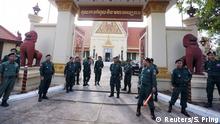
“That Thai wall obstructing his return could enhance further Sam Rainsy’s stature and popularity just as Iranian political and cleric Ayatollah Khomeini gained while in exile in France before returning triumphantly in 1979,” Mong Hay said, adding that Rainsy remained a “phenomenon” and a “force to reckon with” for Hun Sen.
Questions over Rainsy’s Cambodia return after deputy turned back
Thailand denied entry to Mu Sochua, raising doubts about plan for opposition leaders to take land route back home.by Andrew Nachemson19 hours ag
Phnom Penh, Cambodia – The deputy leader of Cambodia’s opposition party has been denied entry to Thailand, casting doubt on party leader Sam Rainsy’s pledge to return from exile in Paris in early November.
Cambodia National Rescue Party (CNRP) Vice-President Mu Sochua was denied entry in Bangkok on October 20 and sent back to Kuala Lumpur in Malaysia. From there, she headed to the United States, where she is also a citizen.
“I made it all the way to the biometrics, the fingerprint. The guy looked at the screen, then looked at me and pushed a button. And I knew that was it,” Sochua said in an interview with Al Jazeera.
Sochua said the immigration officials who detained her were “extremely polite”.
Thai immigration authorities did not respond to requests for comment, but a document viewed by Al Jazeera showed that Sochua was rejected for “having behaviour which (was) possibly harmful” to Thai society.
CNRP President Kem Sokha was arrested for treason in September 2017, and Sochua fled the country the following month. By November the party was dissolved entirely, allowing long-time Prime Minister Hun Sen to claim all 125 parliament seats in last year’s election.
| Cambodia’s exiled former opposition leader calls for uprising |
Sochua and CNRP co-founder Sam Rainsy – who has remained abroad since 2015 to avoid charges – pledged to return to Cambodia by land on November 9. They said they would rally thousands of supportive Cambodian migrant workers to come from Thailand with them.
It is the third time this year Rainsy has set a deadline for his return, and the government has responded by arresting dozens of supporters across the country, accusing them of plotting a coup. Hun Sen has also threatened to deploy the armed forces.
‘Thai wall’
A spokesman for Cambodia’s Ministry of Foreign Affairs told pro-government media Sochua was “blacklisted” from Thailand after the Cambodian government claimed it would issue arrest warrants to all ASEAN countries.
Veteran political analyst Lao Mong Hay said that with Sochua denied entry, Rainsy risked arrest and extradition if he tried to enter Thailand.
Mong Hay said Rainsy’s pledge to involve Thai-based migrant workers may have forced the Thai government’s hand.
“Hun Sen would be satisfied by that much cooperation from Thailand while it can ensure no disruption to Cambodian labour employed in its economy,” Mong Hay said.
However, Mong Hay said Rainsy’s inability to enter the country could actually help him.
“That Thai wall obstructing his return could enhance further Sam Rainsy’s stature and popularity just as Iranian political and cleric Ayatollah Khomeini gained while in exile in France before returning triumphantly in 1979,” Mong Hay said, adding that Rainsy remained a “phenomenon” and a “force to reckon with” for Hun Sen.
Ear Sophal, a Cambodian-American associate professor of diplomacy and world affairs at Occidental College, agreed that any reputational damage to Rainsy would be minimised if he genuinely tried to return.
“He’s got to get close and he gets an A for effort at least,” Sophal said via email.
Continue reading




